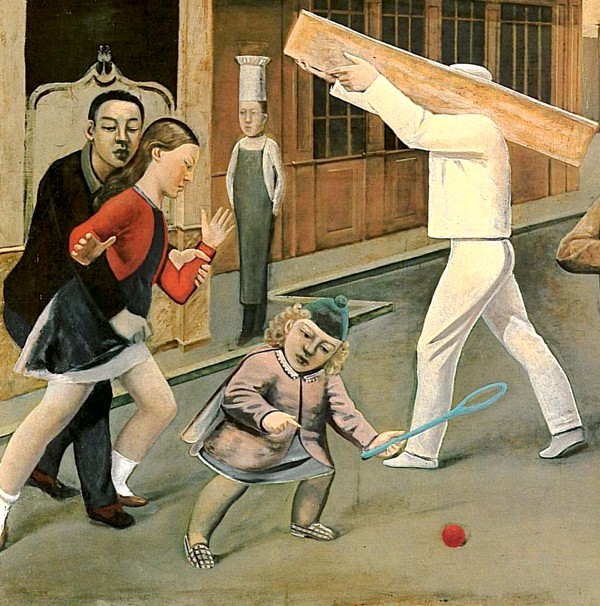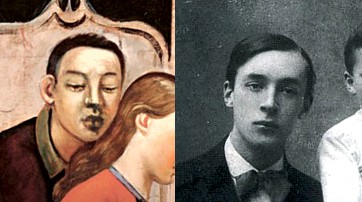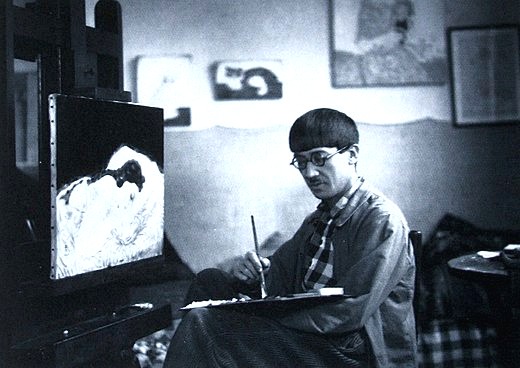
Chapter Seven
Rather than dwell on the unpleasant and, truth be told, unforeseen afteraffects of my visit to Madame Fat and the mysterious events pursuant thereto, I shall now discuss matters more literary, less metaphysical, partly in the interest of the maintenance of my own mental equilibrium, partly in response to what an impartial observer would certainly characterize as the overly vociferous behest of my good, but sometimes impatient, editor, who enjoined me, in a fax sent to the seedy but comfortable hotel in Villefranche-sur-Mer where I was recovering from recent scholarly labors, to "get on with it." (Incidentally, the sea softly plashing against the sandy edge of this charming townlet is, at noon, a deep azure hue, recalling a certain lake in my homeland, a distant northern land. And at night, I have noticed on my insomniac rambles, the moon casts slivers of silvery light upon the ink-black waters. Do remind me to say more of this later.)
The original contract for this book (signed three years ago with a then noticeably more solicitous publisher whose name I am legally bound not to mention) stipulated that the text be comprised not only of biography proper (of which the reader has already enjoyed, I trust, a taste) but also of criticism of each of Nabokov's books. In lieu of any sensible reason not to proceed in any but a chronological, or pseudo-chronological, fashion, I turn now to Korol', dama, valet,2 a novel quite different from Mashen'ka, strangely lacking in luster, which a 28-year-old Sirin began in July of 1927 and a 29-year-old Sirin completed in June of the following year, not very far from here, I'm told.
The plot, though banal, perhaps bears repeating. A brooding, not unattractive boy named Frants arrives in a large German city--manifestly Berlin though unnamed in the book--with the hope that his maternal uncle, a wealthy speculator and businessman who owns, among other things, a large department store, will assist him in making his fortune. Dreyer's callous wife, Marta, manages to seduce and ensnare the poor lad and subsequently convince him that the sole obstacle to their conjoined and connubial bliss is her husband and that he, the husband, should be done away with as quickly as possible. Much of the book revolves around their miserable affair and the plan to kill Dreyer. It is a pity that Sirin chose to have Frants copulate with puffy, toad-like Marta,3 rather than explore a more manly, and more salubrious, relationship with the older, wiser, kinder Dreyer. The increasingly half-hearted couplings of the two 'lovers' are the book's worst passages, with elaboratedly contrived metaphorical orgasms,4 barely bearable, liable to make readers like myself fidget uncomfortably in their chairs.
This being Sirin's weakest book, it might be useful to point out those passages wherein a glimmer of better things can be glimpsed rather than attempt to explicate a narrative technique that is transparently jejune. There are fore-echoes of nearly all the later novels in Korol', dama, valet and at least a few after-echoes of Mashen'ka. What I propose to do is simply to list them, more or less in the order that they appear, with as little superfluous commentary as coherence will allow. I have often felt that modern literary criticism, especially the 'scholarly' kind, suffers from a surfeit of 'interpretation' at the expense of simple facts.
As many authors have noted, keys, both actual and metaphorical, play a predominant role in Nabokov's greatest Russian novel Dar (1938).5 The key theme, with an admixture of the so-called 'anticipatory memory' for which Nabokov would be so well-known, is neatly foreshadowed in Chapter 2 of Korol', dama, valet:

And later:
"Opiat' chto-to sluchilos' s etim kliuchom,--schert' ego poberi. [...] I vot etot kliuch--tozhe mudrit..." (188).
The key, multiplied, returns a final time in chapter 10 in a daydream of Frants's: "Emu pomereshchilos' kak-to, chto v moloden'koi devushke s podprygivaiushchei grud'iu, v krasnom plat'e, kotoraia pobezhala cherez ulitsu so sviazkoi kliuchei v ruke, on uznal dochku shveitsara" (238). (I should point out that this hypnopompic image seems to be a foreglimpse of a painting by the fake baron Balthasar de Klossowski, known as Balthus, who lived, and lives, not far from the elderly Nabokov above the shores of Lac Léman. The painting is titled La rue [1933] and depicts a surreal street scene featuring all sorts of somnabulistic oddballs, in the midst of which a young girl in a red dress runs, or rather does not run, for she is being restrained by a sinister figure who could easily pass for a youthful Volodya Nabokov:

This series, I think everyone will agree, is a clumsy first draft of the subtle 'key' motif in Dar, in which, as here, a simple latchkey is one of the story's most important recurring devices. By the way, in another fleeting, and inexplicable, art historical reference, Sirin has Frants, in chapter 12, "V ochkakh, v pestrom khalate [...] smutno pokhodil na iapontsa"--a probable reference to a well-known sea-side photograph of the Japanese painter Foujita, who by then had settled in France.

On the next page there is a metaphor that prefigures Zashchita Luzhina, in which chess overlays and overwhelms the life of Grandmaster Luzhin.6 Again it is Marta to whom the passage refers:
"Chut' li ne v pervyi raz ona chuvstvovala nechto, ne predvidennoe eiu, ne vkhodiashchee zakonnym kvardatom v parketnyi uzor obychnoi zhizni" (139-140).
As the reader will recall, Luzhin's life, or rather his death, at the end of Zashchita Luzhina, is laid out below him in a pattern of squares: "Tam shlo kakoe-to toroplivoe podgotovlenie: sobiralis', vyravnivalis' otrazheniia okon, vsia bezdna raspadalas' na blednye i temnye kvadraty" (lage page of ZL). The chess theme briefly reappears in chapter 11 of KDV as a numb Frants stares out his window on the eve of his (and Marta's and Dreyer's) departure for the seashore; he looks at a "dal'nii balkon, gde gorit lampa pod krasnym abazhurom i, sklonias' nad osveshchennym stolom, dvoe igraiut v shakhmaty" (252).
The novel includes several coarse gibes at sexuality à la Freud, whom we now know Nabokov was much too hard on, beginning with the phallic train entering the vaginal station tube, Marta and her "mokryi zontik," and the "korichnevataia roza," a phrase that turns up 27 years later in the Master's most famous book as "brown rose," an inept euphemism for a young girl's genitalia rather than as a mock Freudian image, which has apparently appeared here under the author's pen without his being aware of it. There is also Frants' holey sock, through which his "bol'shoi palets" (174) sticks, a protruding phallus that thematically recalls the hole in the boy Ganin's sock in chapter 8 of Mashen'ka, though in this latter case the hole is on the ankle rather than the toe ("on ... zametil nekstati, chto chernyi shelkovyi nosok porvalsia na shchikolotke" [74]). By the way, 59 pages later, Marta darns that sock (236). I hope the reader is enjoying this tabulation of minutiae.
In chapter 3, a distant relative of Pnin's squirrel turns up in the form of Dreyer's odd gift to him wife: "belku, ot kotoroi durno pakhlo" (p. 155). Why the squirrel should stink I do not know. Zemblan squirrels are fastidious creatures, popular pets, especially among the young, and, compared to dogs, rabbits and sables, relatively inodorous.
For example, only a page later we learn that Frants "ezhednevno brilsia, unichtozhaia ne tol'ko tverdyi temnyi volos na shchekakh i na shee, no i legkii pukh na skulakh" (164). Later Dreyer imagines going to the gallows on the morning of one's execution "posle osnovatel'nogo brit'ia" (241) (a scene which foreshadows, we note en passant, the ending of Priglashenie na kazn'). While we are on the topic of grooming, it should be said that the "mel'chaishie ugri, druzhno zhivshie po bokam nosa, bliz uglovatykh ego nozdrei" (164) are but early avatars of the blackheads spotting the wings of Paduk's fattish nose in Bend Sinister. (For more on The Toad, see footnote 3.) While we are on the topic of tyrants, it is interesting to note that innocuous Frants, whom Nabokov would transform 40 years later into a blandly cruel proto-Nazi, already in 1928 or 1929 sports the forelock of our century's most infamous dictator: "odna korichnevaia priad' imela obyknovenie otkleivat'sia i spadat' emu na visok, do samoi brovi" (164).
By the time he composed Zashchita Luzhina just a year later, Sirin had become much more adept at slyly planting clues in such a way that their relevance was neither immediately obvious to all but the most forgetful reader nor so obscure as to amount to private jokes. But in Korol', dama, valet such things are clumsily handled. When the inventor tells Dreyer he is staying at the hotel Video (170), the author makes us privy to absentminded Dreyer's unsuccessful groping after a memory of that name, which of course tips us off, if we have somehow managed to forget the name of Frants' hotel revealed three chapters, or 43 pages earlier, that there is some connection to be made. Même jeu for the noseless, monkey-faced man, whom Frants encounters in chapter 1 and much later, I don't recall precisely where, is prompted by the author to theatrically recall when another face jars his dim recollection. Much more successful, and more characteristic of the mature Nabokov, is the mechanism in chapter V by which Dreyer's memory is nudged into recalling the inventor and his automatons: "on zametil iz okna gospodina, tochno na sharnirakh, melkimi shazhkami perekhodivshego ulitsu,--i srazu, pochemu-to [and this 'pochemu-to' is the signal for us to seek a connection], vspomnil razgovor s mileishim izobretatelem" (180). In later works, there will be fewer and fewer pochemu-to's, and it will be up to the reader to mentally collect and connect the dots with which Nabokov spots his texts.
The beguiling "printsitutki"of Mashen'ka's chapter 5 returns in the more prosaic form "prostitutsiia" in KDV's chapter VIII, again linked in Frants' mind, as it had been in Ganin's, with a schoolboy memory: "Frants pochemu-to vspominal, kak v shkol'nye gody taikom chital v takom zhe slovare stat'iu o prostitutsii" (215). (The young, hopelessly heterosexual Sirin seems to have taken a keen interest in whores.)
The first mention of cocaine of which I am aware in Sirin's work also appears in chapter 8 (p. 216). As readers aware of recent controveries can attest, cocaine is mentioned time and again in Sirin's novels and short stories. His Roman s kokainom, often misattributed to the pseudonymous Mikhail Ageev, represents the apex of our hero's obsession with that drug.
KDV. (I am uncertain of their relevance, other than as an echo of the novel's tripartite title.) A hastily compiled catalog gives:
Frants's initial stay in third class on the train to Berlin (121); the three parts of the mystery play stage set (121); the "tri dyrki" of a sleeping Frants's countenance ("dve blestiashchikh,--stekla ochkov, i odna chernaia -- rot" [123]); Marta's "treugol'nik lba" as seen by Dreyer in a mirror (137); frequent occurences of three-word sentences or parallel constructions ("Khorosho, prostorno, prokhladno" [141], "on pochustvoval u sebia v golove vse miachi, vse miachiki, vse miachishki" [163]--which is itself an echo of the series in chapter 2 of Mashen'ka "i bubliki, i brilliantin i prosto brillianty" [M, 40] "Ona rassprashivala ego o detstve, o materi, o rodnom ego gorodke" [165-166], "Draier zapolnial vsiu spal'niu, ves' dom, ves' mir" [236], "Voda. Iasnost'. Schast'e." [244], "Vse krugom zhurchalo, shelestelo, dyshalo" [245], "Eti rasfufyrennye rebiatishki teper' kuptsy, inzhenery, chinovniki..." [255], ona chuvstvovala i pokoi, i osvobozhdenie, i blagodarnost'" [277], "V dushe byla pustota, glukhota, pokornost'" [278]); simple repetitions of the same word or words (Dreyer's insistance to Frants that he call him "diadia, diadia, diadia" [134], his statement to the chauffeur:"Trakh, trakh i eshche raz trakh" [161], "vse ravno--segodnia, segodnia, segodnia" [167], "Sleduiushchii raz, vot klianus', klianus'... matushkoi klianus'..." [172], "IA schitaiu pro sebia, schitaiu... schitaiu..." [177], "na beluiu, beluiu, nesterpimo beluiu skatert'" [194], "Osmotren. Osmotren. Osmotren." [228], "Net, net, net" [229], "Chisti zuby nashei pastoi, ulybat'sia budesh' chasto. Chisti zuby nashei pastoi. Chisti zuby--" [237]);
Where all this leaves us, and the reader, I'm not sure. To my mind the most successful passage in the book occurs near the end, in chapter 11: "Oslepitel'no gorela na solntse serebrianaia sakharnitsa. Potom ona medlenno potukhla. Vspykhnula snova" (244). This is quintessential Nabokov. On the other hand, Erika's criticism of Dreyer might well be applied to the author, whose cruel streak is well-known: "Chuvstvitel'nost' egoista,--govorila kogda-to Erika: -- ty mozhesh' ne zametit' chto mne grustno, ty mozhesh' obidet', unizit',-- a vot tebia trogaiut pustiaki..." (256). Details are fine, but it is the incomparably more sublime issue of the human experience that should suffuse all art. I am saddened that Sirin chose not to explore more fully the regal theme hinted at in the title of his work (see footnote 2).
One final testenbörder, as we say in Zemblan. In an obvious nod to the first sign of trouble for Josef K. in Kafka's Der Prozess, published just a few years before KDV ("Die Köchin der Frau Grubach, seiner Zimmervermierterin, die ihm jeden Tag gegen acht Uhr früh das Frühstück brachte, kam diesmal nicht. Das war noch niemals geschehen.") Frants wonders, near the end of chapter 11, "Pochemu emu ne dali segodnia kofe?" (253-254). Why indeed. For more on Nabokov and that other Franz, see my chapter 5.
1. All references are to Vladimir Nabokov, Korol', dama, valet, in Sobranie sochinenii v chetyrekh tomakh KDV.
2. That the Russian title is an anagram of "Look at Valdemar," a veiled reference to Valdemar the Vague (1803-1867, reigned 1815-1863), a wise but weak king who died in exile, should not be overlooked. Valdemar, whose name is a Zemblan variant of the more common Slavic "Vladimir," came to power as a diffident boy of twelve in the early years of the nineteenth century. Harrassed by his ambitious mother, Queen Sidra of Bey, who wanted her son to be a fearless warrior king in the tradition of her own father, Thorlak the Third, and caressed by his regent, the Archduke Hingold iz Octane, who was less concerned with the fate of the kinglet's kingdom than with his own fleeting pleasure and prestige, Valdemar somehow managed to avoid all the paths his several mentors had striven to lay out before him and became, much to everyone's surprise, a virile, athletic, erudite, good-natured, and amusing monarch, much loved by his people but unfortunately given to reverie to such an extent that his daydreamy distraction was totally incompatible with overseeing the affairs of a small, but sometimes complicated, state. Eventually ousted by members of a clandestine group of fed-up nobles, Valdemar fled to Paris, where he died, heirless, in 1867.
3. Marta is described as "pokhozhaia na bol'shuiu beluiu zhabu" on. p. 369. This is the second toad to appear in Sirin's prose. The first appears early in chapter 2 of Mashen'ka, in the form of an inkwell on the late Herr Dorn's oak writing desk, a "dubovaia gromada s zheleznoi chernil'nitsei v vide zhaby." These are the first in a series of innocuous forerunners to The Toad, the tyrant Paduk of , q.v.
4. See especially p. 236 and Frants' miserable nocturnal emission on p. 160.
5. See, for example, D. Barton Johnson's "The Key to Nabokov's Gift" in Canadian-American Slavic Studies
6De tranquilitate animi, I think.)